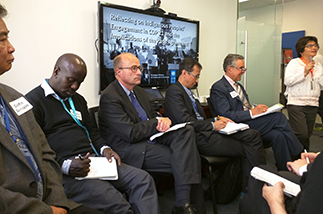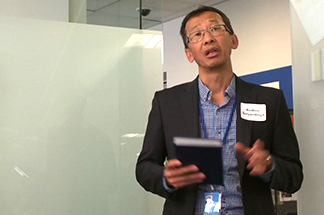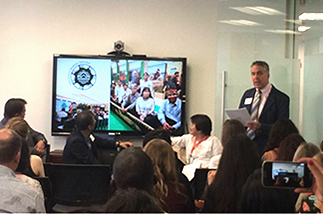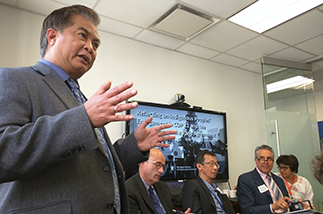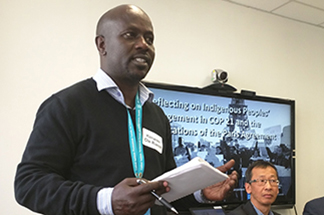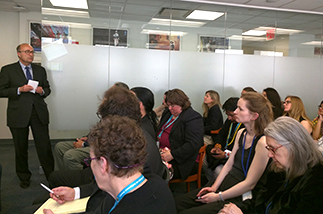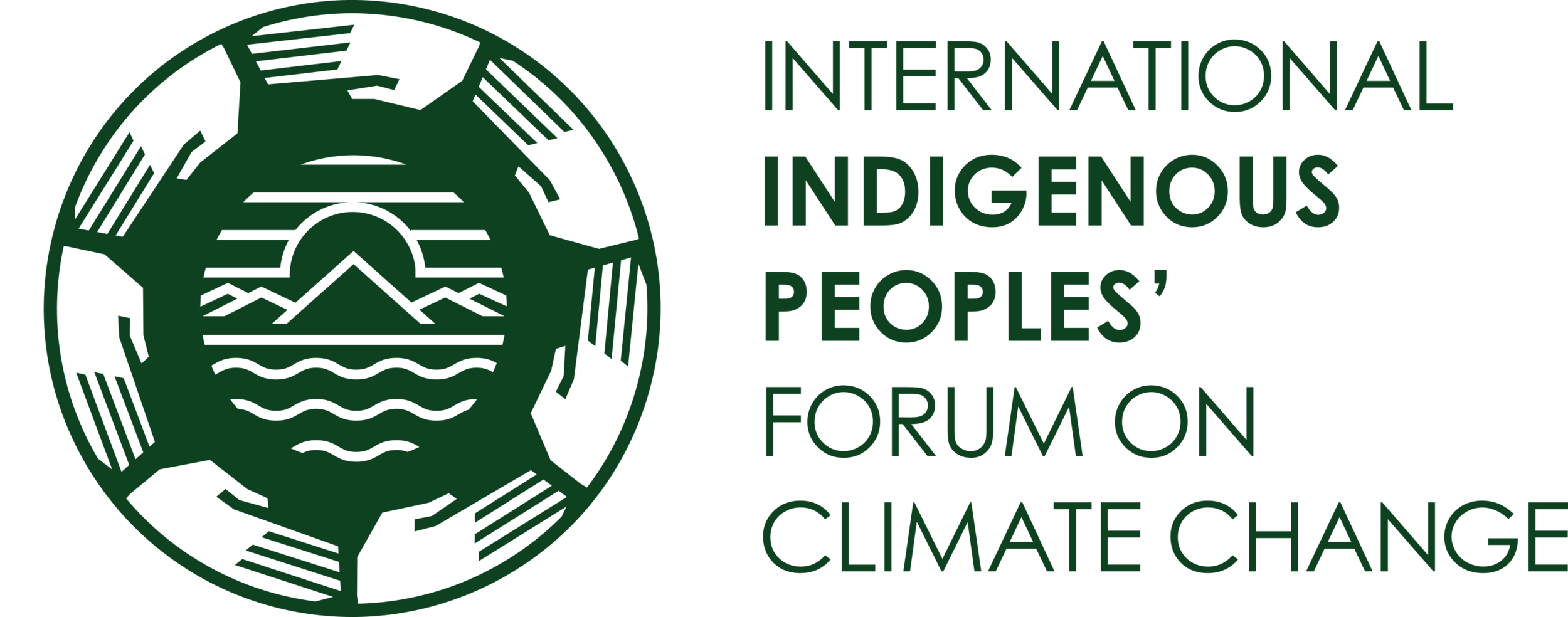UNPFII SIDE EVENT REPORT
Reflecting on Indigenous Peoples' Engagement in COP 21and the Implications of the Paris Agreement
11 May 2016 – UN Headquarters, New York
Programme
On Wednesday 11 May 2016, during the United Nations Permanent Forum on Indigenous Issues (UNPFII), the United Nations Development Programme (UNDP) and the International Indigenous Peoples’ Forum on Climate Change (IIPFCC) co-hosted a side event to report on indigenous peoples’ participation in UNFCCC COP 21 and reflect on the outcomes and achievements of their advocacy and engagement. Panellists were welcomed by a full house and a number of viewers joining via live webcast.
From left to right: Panel members Delfin Ganapin, Kimaren Ole Riamit, Hans Brattskar, Rodion Sulyandziga and Charles McNeill with Joan Carling providing opening remarks; Rodion Sulyandziga speaks about the outcomes of the IIPFCC at COP 21 in 2015; Attendees fill the house at UNDP Headquarters. All photos © UNDP 2016.
The event was chaired by Joan Carling (Secretary-General, Asia Indigenous Peoples Pact and member of the IIPFCC Global Steering Committee) and focused on a major initiative implemented by UNDP in partnership with the IIPFCC, with generous support from the Government of Norway, to ensure indigenous voices would be heard in the Paris climate negotiations. The initiative was launched at the UNPFII a year previously.
Charles McNeill (UNDP) gave an overview of the key activities supported throughout 2015 at national, regional and global levels, working with indigenous organizations in seven regions around the world (Africa, Arctic, Asia, Latin America & the Caribbean, North America, Russia & Eastern Europe, and Pacific). These activities included supporting indigenous peoples’ preparation for effective advocacy in Paris through consultations and preparatory meetings, and supporting indigenous peoples’ engagement with governments in the lead up to COP 21 through national, regional and global Indigenous Peoples-Government dialogues. High visibility of indigenous peoples at COP 21 was ensured by facilitating the travel of over 160 indigenous representatives to Paris to participate in the negotiations, as well as hosting an Indigenous Peoples’ Pavilion and a high profile Equator Prize 2015 Awards Ceremony to highlight indigenous climate action. A worldwide communications and media engagement strategy brought the connections between indigenous peoples, land rights and climate change to a new, global audience, with indigenous climate issues covered in over 300 news stories including top-tier outlets.
Reflecting on the achievements of the initiative, Charles noted that COP 21 saw: indigenous rights and priorities embedded throughout the Paris Agreement on Climate Change; a sea-change in public understanding of the role of indigenous peoples in mitigating climate change; unprecedented engagement between indigenous peoples and national governments at a scale greater than ever before in the climate change context; generation of high quality, cutting edge films and knowledge products to advance indigenous peoples’ advocacy, policy and finance; and the creation of lasting platforms for engagement, advocacy and knowledge sharing.
From left to right: Delfin Ganapin speaks to attendees on the impacts of national and regional IP-Government dialogues; Kimaren Ole Riamit presents on the implications of the Paris Agreement on indigenous peoples; Ambassador Hans Brattskar affirming Norway's commitment to indigenous peoples and forest communities. All photos © UNDP 2016.
Rodion Sulyandziga (Co-Chair, IIPFCC Global Steering Committee) spoke next, reflecting on the depth and breadth of the Indigenous Peoples’ Caucus’ advocacy and preparations in the lead-up to and at COP 21. He noted the importance of having indigenous voices heard in international climate change processes, given indigenous peoples’ vulnerability to climate change impacts and responses as well as their crucial contributions to climate change mitigation and adaptation. Rodion noted the value of having such a large and vocal indigenous presence in Paris and the value of this collaboration in terms of supporting activities that might not have been possible otherwise at this scale. He also noted that the Indigenous Peoples’ Caucus will continue to engage in the global climate change processes to ensure that indigenous rights are respected as the Paris Agreement and INDCs are implemented.
Delfin Ganapin (Global Manager, UNDP-GEF Small Grants Programme) gave a deeper analysis of the impacts and outcomes of the 27 national and regional IP-Government dialogues that were implemented in partnership among UNDP, the IIPFCC and the Small Grants Programme. The dialogues allowed over 1,300 indigenous representatives to engage in direct dialogue with their national governments in the lead-up to COP 21 and ensured that indigenous peoples’ concerns and priorities were embedded in their countries negotiating positions for COP 21. The dialogues were the largest ever engagement among indigenous peoples and governments in the lead up to a climate conference and resulted in concrete outcomes and commitments from governments to increase indigenous representation on national task forces and decision-making bodies, to incorporate indigenous development plans into national planning, to incorporate indigenous priorities into INDCs and country negotiating positions for COP 21, and to engage in follow up dialogues on an ongoing basis. Delfin also announced SGP’s commitment to launch an Indigenous Peoples Fellowship Programme that will continue to support indigenous engagement in climate change and development issues at national and global levels.
Kimaren Ole Riamit (IIPFCC Technical Team member) presented the main outcomes of COP 21 and the implications of the Paris Agreement from the perspective of indigenous peoples. He noted that the preparatory activities supported by this initiative allowed for a coordinated advocacy and lobbying effort, with the result that the key priorities of indigenous peoples were embedded in the Paris Agreement text. These include specific reference to indigenous peoples’ rights within the body of the Agreement; recognition of the role of indigenous knowledge systems and innovations in adaptation and the need to strengthen knowledge, technologies, practices and efforts of local communities and indigenous peoples related to addressing and responding to climate change; and recognition that Parties may be affected not only by climate change, but also by the impacts of the measures taken in response to it—implicitly citing the role of safeguards in addressing the indirect impacts of climate change mitigation and adaptation activities. Kimaren noted that placeholders exist in all five pillars of the negotiations—including mitigation, finance, technology development and transfer, and capacity building—for indigenous peoples to engage creatively with the UNFCCC process going forward.
Hans Brattskar (Ambassador for the Government of Norway), closed the event by affirming Norway’s commitment to continuing its support to indigenous peoples and forest communities through the implementation of Norway’s commitment to devote up to USD 100 million to the rights of indigenous peoples and other forest dependent communities in tropical forests by 2020. He reaffirmed the importance of ensuring that indigenous and community voices are heard in global policy forums, and congratulated the Indigenous Peoples’ Caucus on their successful collaboration and engagement in COP 21.
Further Reference:
A recording of the live webcast can be found here.
More information on the Norway-funded initiative, “Supporting the Meaningful Participation of Indigenous Peoples and Local Communities in UNFCCC COP 21” can be found here.
Meeting of the Indigenous Peoples' Caucus at COP 21 in Paris. Photo © FIAY 2015.



